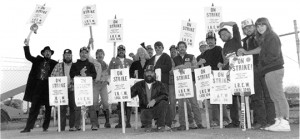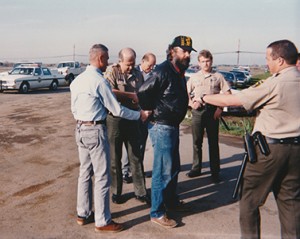The Asplundh strike of 1992 was an act of courage and faith. Striking tree trimmers had the courage to put their job at risk, and had faith that their union brothers and sisters would stand with them.

After the lockout, strikers made it impossible for Asplundh to trim trees. After three weeks of no work getting done, PG&E yanked Asplundh’s contract. Strikers were rehired by the new contractor. IBEW 1245 Archive
Asplundh provoked the strike by locking out the tree trimmers to coerce them into accepting across-the-board wage cuts of $2 an hour. Four days later, IBEW 1245 tree trimmers launched a counter-offensive by staging an hour-long silent vigil at PG&E headquarters in Chico that won positive coverage from several media outlets.
When Asplundh ended the lockout and unilaterally implemented the $2 wage cut, tree trimmers went on strike. Joined by IBEW business representatives, strikers established picket lines wherever Asplundh trucks were parked, and followed the trucks into the field to post pickets at work sites. Strike logistics were coordinated from a motel-room command post in Chico by Business Representative Dean Gurke.
Cal-OSHA, which IBEW 1245 had helped rescue in the 1980s, began shutting down Asplundh crews for non-compliance with California’s High Voltage Safety Orders, orders the union had helped create in the early 1970s. Other IBEW 1245 members quickly raised over $27,000 in immediate cash for the strike’s defense fund.
There were scattered incidents of violence against pickets. A scab gunned his car through a picket line in Chico. An Asplundh supervisor pulled a gun on a picketer in the Oroville area. Another supervisor knocked a picketer to the ground while the picketer was holding his infant child.

Strike coordinator Dean Gurke is hauled away in handcuffs after using his car to block Asplundh trucks. IBEW 1245 Archive Photo by Pete Colbert
Strikers used creative tactics to prevent Asplundh from getting any work done. Strike coordinator Gurke was arrested for blocking Asplundh trucks with his union car. Strikers parked their personal cars under trees that Asplundh wanted to cut. Union “escorts” prevented Asplundh trucks from achieving any speed on the road.
In the strike’s third week, Asplundh’s general manager offered to shrink the wage cut by 85 cents, but refused the union’s demand that he fire or transfer the gun-toting supervisor who had threatened a picketer. Business Manager Jack McNally said the union would rather continue the strike than accept the company’s terms. Before the week was out, PG&E canceled Asplundh’s contract and awarded most of the work to Davey Tree, which hired virtually every striker who wanted to work.
Striker Dave VanderPlas offered this perspective on the strike’s success: “One person can’t do anything. It takes a group of people. And basically the union is the one that organizes a group of people.”
Within a year or so after the strike, Asplundh won a new contract to trim trees around PG&E powerlines. There was no talk of wage cuts.